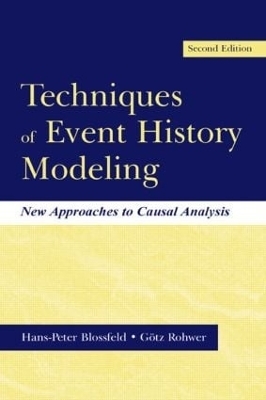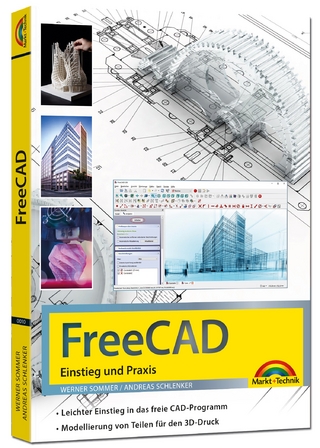
Techniques of Event History Modeling
New Approaches to Casual Analysis
Seiten
2001
|
2nd edition
Psychology Press (Verlag)
978-0-8058-4090-2 (ISBN)
Psychology Press (Verlag)
978-0-8058-4090-2 (ISBN)
The book is for social scientists interested in causal analysis. This can include psychologists, economists, sociologists, education academics.
Including new developments and publications which have appeared since the publication of the first edition in 1995, this second edition:
*gives a comprehensive introductory account of event history modeling techniques and their use in applied research in economics and the social sciences;
*demonstrates that event history modeling is a major step forward in causal analysis. To do so the authors show that event history models employ the time-path of changes in states and relate changes in causal variables in the past to changes in discrete outcomes in the future; and
*introduces the reader to the computer program Transition Data Analysis (TDA). This software estimates the sort of models most frequently used with longitudinal data, in particular, discrete-time and continuous-time event history data.
Techniques of Event History Modeling can serve as a student textbook in the fields of statistics, economics, the social sciences, psychology, and the political sciences. It can also be used as a reference for scientists in all fields of research.
Including new developments and publications which have appeared since the publication of the first edition in 1995, this second edition:
*gives a comprehensive introductory account of event history modeling techniques and their use in applied research in economics and the social sciences;
*demonstrates that event history modeling is a major step forward in causal analysis. To do so the authors show that event history models employ the time-path of changes in states and relate changes in causal variables in the past to changes in discrete outcomes in the future; and
*introduces the reader to the computer program Transition Data Analysis (TDA). This software estimates the sort of models most frequently used with longitudinal data, in particular, discrete-time and continuous-time event history data.
Techniques of Event History Modeling can serve as a student textbook in the fields of statistics, economics, the social sciences, psychology, and the political sciences. It can also be used as a reference for scientists in all fields of research.
G”tz Rohwer, Hans-Peter Blossfeld
Contents: Preface. Introduction. Event History Data Structures. Nonparametric Descriptive Methods. Exponential Transition Rate Models. Piecewise Constant Exponential Models. Exponential Models With Time-Dependent Covariates. Parametric Models of Time-Dependence. Methods to Check Parametric Assumptions. Semi-Parametric Transition Rate Models. Problems of Model Specification. Appendix: Basic Information About TDA.
| Erscheint lt. Verlag | 13.10.2001 |
|---|---|
| Verlagsort | Philadelphia |
| Sprache | englisch |
| Maße | 152 x 229 mm |
| Gewicht | 750 g |
| Themenwelt | Geisteswissenschaften ► Psychologie ► Allgemeine Psychologie |
| Informatik ► Grafik / Design ► Digitale Bildverarbeitung | |
| Sozialwissenschaften ► Soziologie ► Empirische Sozialforschung | |
| Wirtschaft ► Betriebswirtschaft / Management | |
| Wirtschaft ► Volkswirtschaftslehre ► Ökonometrie | |
| ISBN-10 | 0-8058-4090-7 / 0805840907 |
| ISBN-13 | 978-0-8058-4090-2 / 9780805840902 |
| Zustand | Neuware |
| Haben Sie eine Frage zum Produkt? |
Mehr entdecken
aus dem Bereich
aus dem Bereich
Modelle für 3D-Druck und CNC entwerfen
Buch | Softcover (2022)
dpunkt (Verlag)
34,90 €
alles zum Drucken, Scannen, Modellieren
Buch | Softcover (2024)
Markt + Technik Verlag
24,95 €


